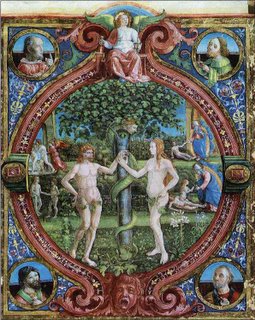John Calvin’s Theology (Part Four) – The Human Condition: Why Did Adam Sin?
 If you will recall from my previous post titled John Calvin’s Theology (Part Three) – The Human Condition. I ended the post by asking these two questions; what then caused Adam to sin (granting he was not corrupt to begin with), and how did Adam’s sin actually effect Adam and all those who proceed from him? Calvin actually begins the second book in his Institutes by attempting to answer these two questions. In this post, we will focus only on the first question and save the second question for a subsequent post (since there is too much in both questions to handle in a single post).
If you will recall from my previous post titled John Calvin’s Theology (Part Three) – The Human Condition. I ended the post by asking these two questions; what then caused Adam to sin (granting he was not corrupt to begin with), and how did Adam’s sin actually effect Adam and all those who proceed from him? Calvin actually begins the second book in his Institutes by attempting to answer these two questions. In this post, we will focus only on the first question and save the second question for a subsequent post (since there is too much in both questions to handle in a single post).Calvin declares to his reader that it is necessary “to attend to the peculiar nature of the sin which produced Adam’s fall, and provoked God to inflict such fearful vengeance on the whole of the human race.” Apparently, during Calvin’s day, and just prior to Calvin’s day, a view about the cause of Adam’s fall which was called “sensual intemperance” was being circulated. Essentially, this view held that Adam and Eve committed the “first sin” due to a desire to have the one fruit they were told not to partake of. Calvin calls this view “childish” because, as Calvin declares, “The sum and substance of all virtues could not consist in abstinence from a single fruit amid a general abundance of every delicacy that could be desired, the earth, with happy fertility, yielding not only abundance, but also endless variety.” In other words, Adam and Eve had the whole earth and all that was there for them in all its overwhelming variety. Thus, for Calvin, he believes the issue goes much deeper than mere “sensual intemperance.”
Calvin taught that when God commanded Adam and Eve to not eat of the tree of the knowledge of good and evil this was in fact a trial of their obedience to God. Our First Parent’s observing this law would in fact, Calvin declares, prove their willing submission to the actual command of God. Therefore, when they disobeyed, this was a demonstration of a lack of contentment with their lot in the context of this command. At this point, Calvin turns to Saint Augustine for support that this lack of contentment was lost in the sin of pride. Calvin agrees with Augustine that pride was the beginning of all evil because, as Calvin declares, “. . . had not man’s ambition carried him higher than he was permitted, he might have continued in his first estate.”
However, Calvin declares that while Augustine is correct, there must surely be more. Where did this pride come from? This is where Calvin’s study of the law prior to his becoming a theologian has a serious effect on his thinking in these issues. Calvin delineates that there are two factors involved in the fall. The first of these factors is the command of God and the second of these factors is the devil (or serpent). Calvin describes, “When, by the subtlety of the devil, the woman faithlessly abandoned the command of God, her fall obviously had its origins in disobedience.” Thus, there was the factor of the law and the factor of an external temptation via the serpent.
So Calvin would and does declare that Adam and Eve sinned because, first, man revolted against the authority of God, second, man allowed himself to be ensnared by the wiles of the devil, and third, because man also despised the truth and turned to lies. Calvin sums up this section by declaring, “Hence infidelity was at the root of the revolt. From infidelity, again, sprang ambition and pride, together with ingratitude; because Adam, by longing for more than was allotted him, manifested contempt for the great liberality with which God had enriched him” (empahsis mine). But, how did this first sin committed by Adam and Eve (our First Parents) affect the rest of mankind? In other words, what was the end result of their sin?
[Stay tuned . . . more to come!]


2 Comments:
You write so well and have a great insight into the scripture. Thanks for taking me through The human condition with John Calvin. I have been following along.
PB,
You're welcome, I am glad it has been a benefit to you.
Post a Comment
<< Home